Analyzing Legality of Trade Blockade Against Qatar Under WTO Rules
VerifiedAdded on 2023/06/03
|44
|15917
|425
Case Study
AI Summary
This case study examines the legality of the trade blockade imposed on Qatar by a Saudi-led quartet under the framework of the World Trade Organization (WTO). It focuses on the apparent conflict between the Most-Favored-Nation (MFN) principle, as enshrined in Article I of the General Agreement on Tariffs and Trade (GATT), and the security exceptions outlined in Article XXI. The analysis reviews Qatar's consultation requests to the WTO Dispute Settlement Body (DSB) and the invoking of the National Security Article by Saudi Arabia, UAE and Bahrain. The study explores relevant WTO case laws to assess whether the blockade constitutes an illegal violation of WTO obligations or a justifiable action under the security exception, ultimately testing the hypothesis that the sanctioned countries misused the security exception to bypass their general obligations under WTO agreements. Desklib provides access to similar case studies and resources for students.
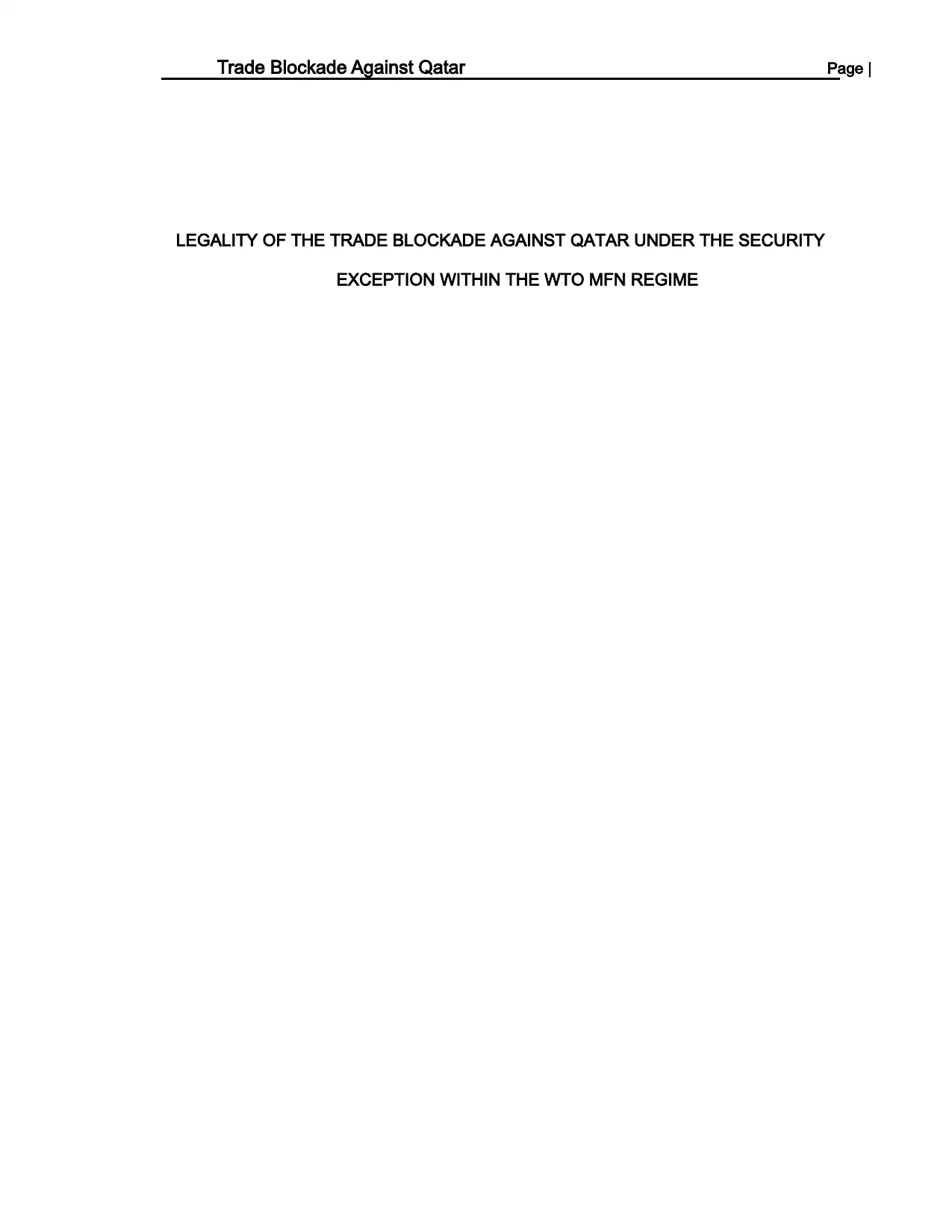
Trade Blockade Against Qatar Page |
LEGALITY OF THE TRADE BLOCKADE AGAINST QATAR UNDER THE SECURITY
EXCEPTION WITHIN THE WTO MFN REGIME
LEGALITY OF THE TRADE BLOCKADE AGAINST QATAR UNDER THE SECURITY
EXCEPTION WITHIN THE WTO MFN REGIME
Paraphrase This Document
Need a fresh take? Get an instant paraphrase of this document with our AI Paraphraser
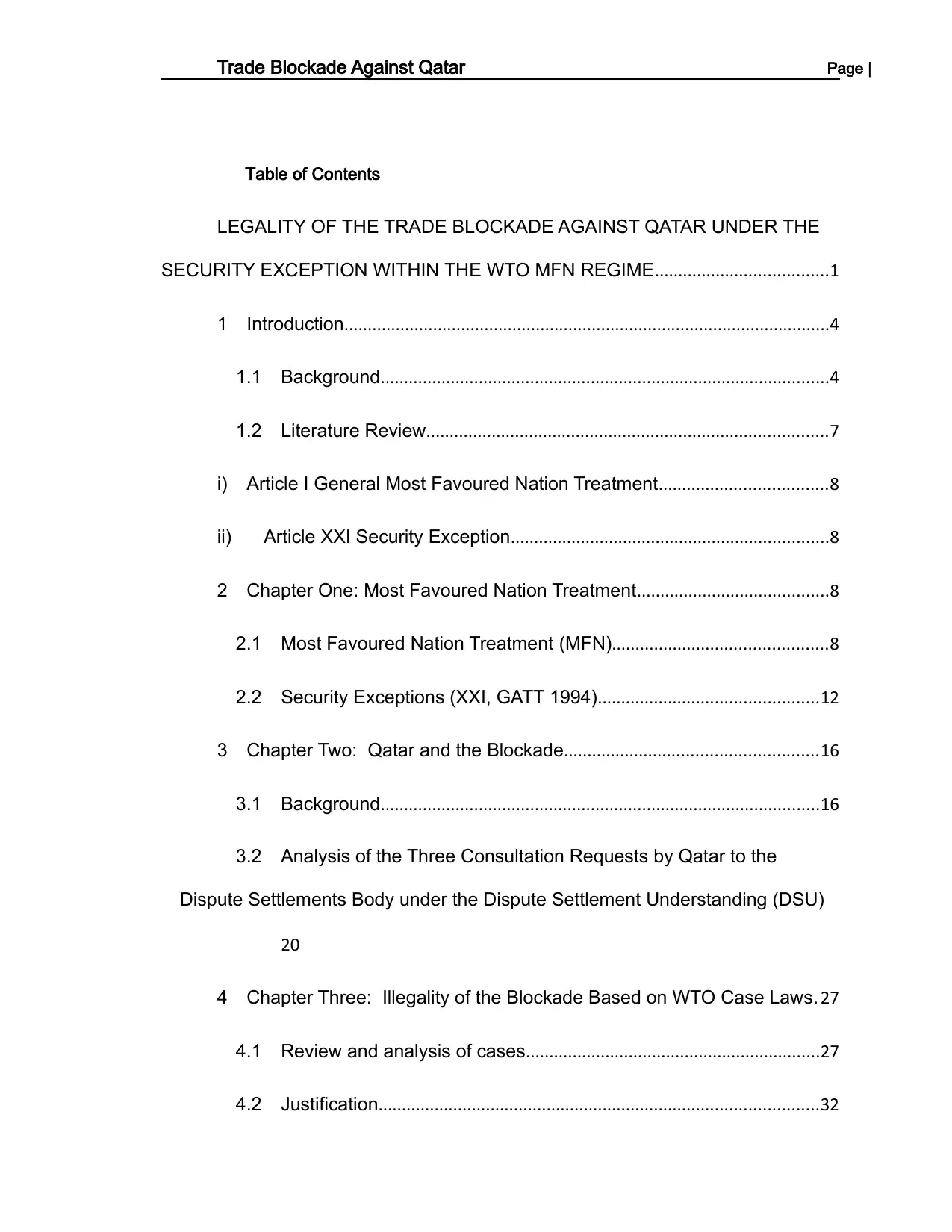
Trade Blockade Against Qatar Page |
Table of Contents
LEGALITY OF THE TRADE BLOCKADE AGAINST QATAR UNDER THE
SECURITY EXCEPTION WITHIN THE WTO MFN REGIME.....................................1
1 Introduction........................................................................................................4
1.1 Background................................................................................................4
1.2 Literature Review......................................................................................7
i) Article I General Most Favoured Nation Treatment....................................8
ii) Article XXI Security Exception....................................................................8
2 Chapter One: Most Favoured Nation Treatment.........................................8
2.1 Most Favoured Nation Treatment (MFN)..............................................8
2.2 Security Exceptions (XXI, GATT 1994)...............................................12
3 Chapter Two: Qatar and the Blockade......................................................16
3.1 Background..............................................................................................16
3.2 Analysis of the Three Consultation Requests by Qatar to the
Dispute Settlements Body under the Dispute Settlement Understanding (DSU)
20
4 Chapter Three: Illegality of the Blockade Based on WTO Case Laws. 27
4.1 Review and analysis of cases...............................................................27
4.2 Justification..............................................................................................32
Table of Contents
LEGALITY OF THE TRADE BLOCKADE AGAINST QATAR UNDER THE
SECURITY EXCEPTION WITHIN THE WTO MFN REGIME.....................................1
1 Introduction........................................................................................................4
1.1 Background................................................................................................4
1.2 Literature Review......................................................................................7
i) Article I General Most Favoured Nation Treatment....................................8
ii) Article XXI Security Exception....................................................................8
2 Chapter One: Most Favoured Nation Treatment.........................................8
2.1 Most Favoured Nation Treatment (MFN)..............................................8
2.2 Security Exceptions (XXI, GATT 1994)...............................................12
3 Chapter Two: Qatar and the Blockade......................................................16
3.1 Background..............................................................................................16
3.2 Analysis of the Three Consultation Requests by Qatar to the
Dispute Settlements Body under the Dispute Settlement Understanding (DSU)
20
4 Chapter Three: Illegality of the Blockade Based on WTO Case Laws. 27
4.1 Review and analysis of cases...............................................................27
4.2 Justification..............................................................................................32
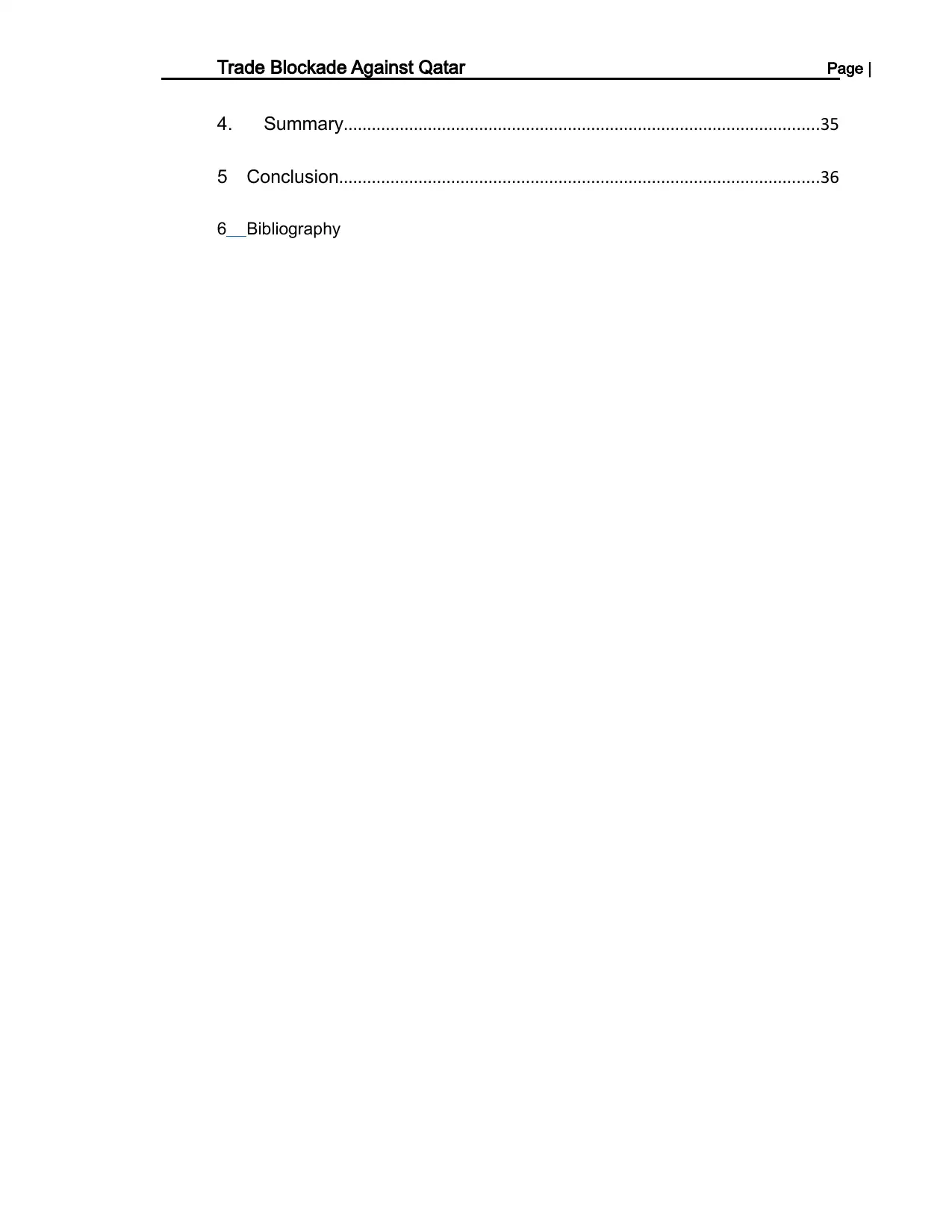
Trade Blockade Against Qatar Page |
4. Summary......................................................................................................35
5 Conclusion.......................................................................................................36
6 Bibliography
4. Summary......................................................................................................35
5 Conclusion.......................................................................................................36
6 Bibliography
⊘ This is a preview!⊘
Do you want full access?
Subscribe today to unlock all pages.

Trusted by 1+ million students worldwide
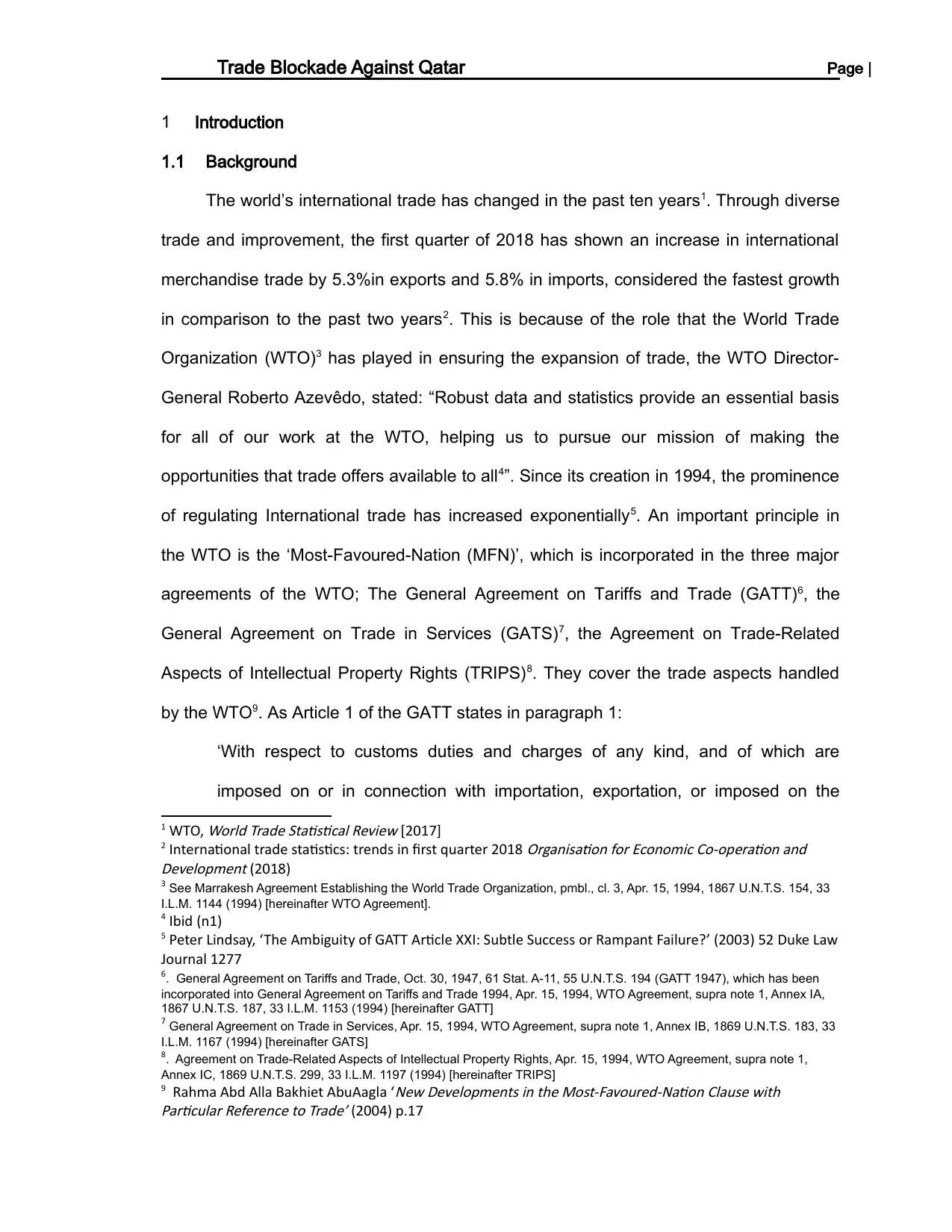
Trade Blockade Against Qatar Page |
1 Introduction
1.1 Background
The world’s international trade has changed in the past ten years1. Through diverse
trade and improvement, the first quarter of 2018 has shown an increase in international
merchandise trade by 5.3%in exports and 5.8% in imports, considered the fastest growth
in comparison to the past two years2. This is because of the role that the World Trade
Organization (WTO)3 has played in ensuring the expansion of trade, the WTO Director-
General Roberto Azevêdo, stated: “Robust data and statistics provide an essential basis
for all of our work at the WTO, helping us to pursue our mission of making the
opportunities that trade offers available to all4”. Since its creation in 1994, the prominence
of regulating International trade has increased exponentially5. An important principle in
the WTO is the ‘Most-Favoured-Nation (MFN)’, which is incorporated in the three major
agreements of the WTO; The General Agreement on Tariffs and Trade (GATT)6, the
General Agreement on Trade in Services (GATS)7, the Agreement on Trade-Related
Aspects of Intellectual Property Rights (TRIPS)8. They cover the trade aspects handled
by the WTO9. As Article 1 of the GATT states in paragraph 1:
‘With respect to customs duties and charges of any kind, and of which are
imposed on or in connection with importation, exportation, or imposed on the
1 WTO,
World Trade Statistical Review [2017]
2 International trade statistics: trends in first quarter 2018
Organisation for Economic Co-operation and
Development (2018)
3 See Marrakesh Agreement Establishing the World Trade Organization, pmbl., cl. 3, Apr. 15, 1994, 1867 U.N.T.S. 154, 33
I.L.M. 1144 (1994) [hereinafter WTO Agreement].
4 Ibid (n1)
5 Peter Lindsay, ‘The Ambiguity of GATT Article XXI: Subtle Success or Rampant Failure?’ (2003) 52 Duke Law
Journal 1277
6. General Agreement on Tariffs and Trade, Oct. 30, 1947, 61 Stat. A-11, 55 U.N.T.S. 194 (GATT 1947), which has been
incorporated into General Agreement on Tariffs and Trade 1994, Apr. 15, 1994, WTO Agreement, supra note 1, Annex IA,
1867 U.N.T.S. 187, 33 I.L.M. 1153 (1994) [hereinafter GATT]
7 General Agreement on Trade in Services, Apr. 15, 1994, WTO Agreement, supra note 1, Annex IB, 1869 U.N.T.S. 183, 33
I.L.M. 1167 (1994) [hereinafter GATS]
8. Agreement on Trade-Related Aspects of Intellectual Property Rights, Apr. 15, 1994, WTO Agreement, supra note 1,
Annex IC, 1869 U.N.T.S. 299, 33 I.L.M. 1197 (1994) [hereinafter TRIPS]
9 Rahma Abd Alla Bakhiet AbuAagla ‘
New Developments in the Most-Favoured-Nation Clause with
Particular Reference to Trade’ (2004) p.17
1 Introduction
1.1 Background
The world’s international trade has changed in the past ten years1. Through diverse
trade and improvement, the first quarter of 2018 has shown an increase in international
merchandise trade by 5.3%in exports and 5.8% in imports, considered the fastest growth
in comparison to the past two years2. This is because of the role that the World Trade
Organization (WTO)3 has played in ensuring the expansion of trade, the WTO Director-
General Roberto Azevêdo, stated: “Robust data and statistics provide an essential basis
for all of our work at the WTO, helping us to pursue our mission of making the
opportunities that trade offers available to all4”. Since its creation in 1994, the prominence
of regulating International trade has increased exponentially5. An important principle in
the WTO is the ‘Most-Favoured-Nation (MFN)’, which is incorporated in the three major
agreements of the WTO; The General Agreement on Tariffs and Trade (GATT)6, the
General Agreement on Trade in Services (GATS)7, the Agreement on Trade-Related
Aspects of Intellectual Property Rights (TRIPS)8. They cover the trade aspects handled
by the WTO9. As Article 1 of the GATT states in paragraph 1:
‘With respect to customs duties and charges of any kind, and of which are
imposed on or in connection with importation, exportation, or imposed on the
1 WTO,
World Trade Statistical Review [2017]
2 International trade statistics: trends in first quarter 2018
Organisation for Economic Co-operation and
Development (2018)
3 See Marrakesh Agreement Establishing the World Trade Organization, pmbl., cl. 3, Apr. 15, 1994, 1867 U.N.T.S. 154, 33
I.L.M. 1144 (1994) [hereinafter WTO Agreement].
4 Ibid (n1)
5 Peter Lindsay, ‘The Ambiguity of GATT Article XXI: Subtle Success or Rampant Failure?’ (2003) 52 Duke Law
Journal 1277
6. General Agreement on Tariffs and Trade, Oct. 30, 1947, 61 Stat. A-11, 55 U.N.T.S. 194 (GATT 1947), which has been
incorporated into General Agreement on Tariffs and Trade 1994, Apr. 15, 1994, WTO Agreement, supra note 1, Annex IA,
1867 U.N.T.S. 187, 33 I.L.M. 1153 (1994) [hereinafter GATT]
7 General Agreement on Trade in Services, Apr. 15, 1994, WTO Agreement, supra note 1, Annex IB, 1869 U.N.T.S. 183, 33
I.L.M. 1167 (1994) [hereinafter GATS]
8. Agreement on Trade-Related Aspects of Intellectual Property Rights, Apr. 15, 1994, WTO Agreement, supra note 1,
Annex IC, 1869 U.N.T.S. 299, 33 I.L.M. 1197 (1994) [hereinafter TRIPS]
9 Rahma Abd Alla Bakhiet AbuAagla ‘
New Developments in the Most-Favoured-Nation Clause with
Particular Reference to Trade’ (2004) p.17
Paraphrase This Document
Need a fresh take? Get an instant paraphrase of this document with our AI Paraphraser
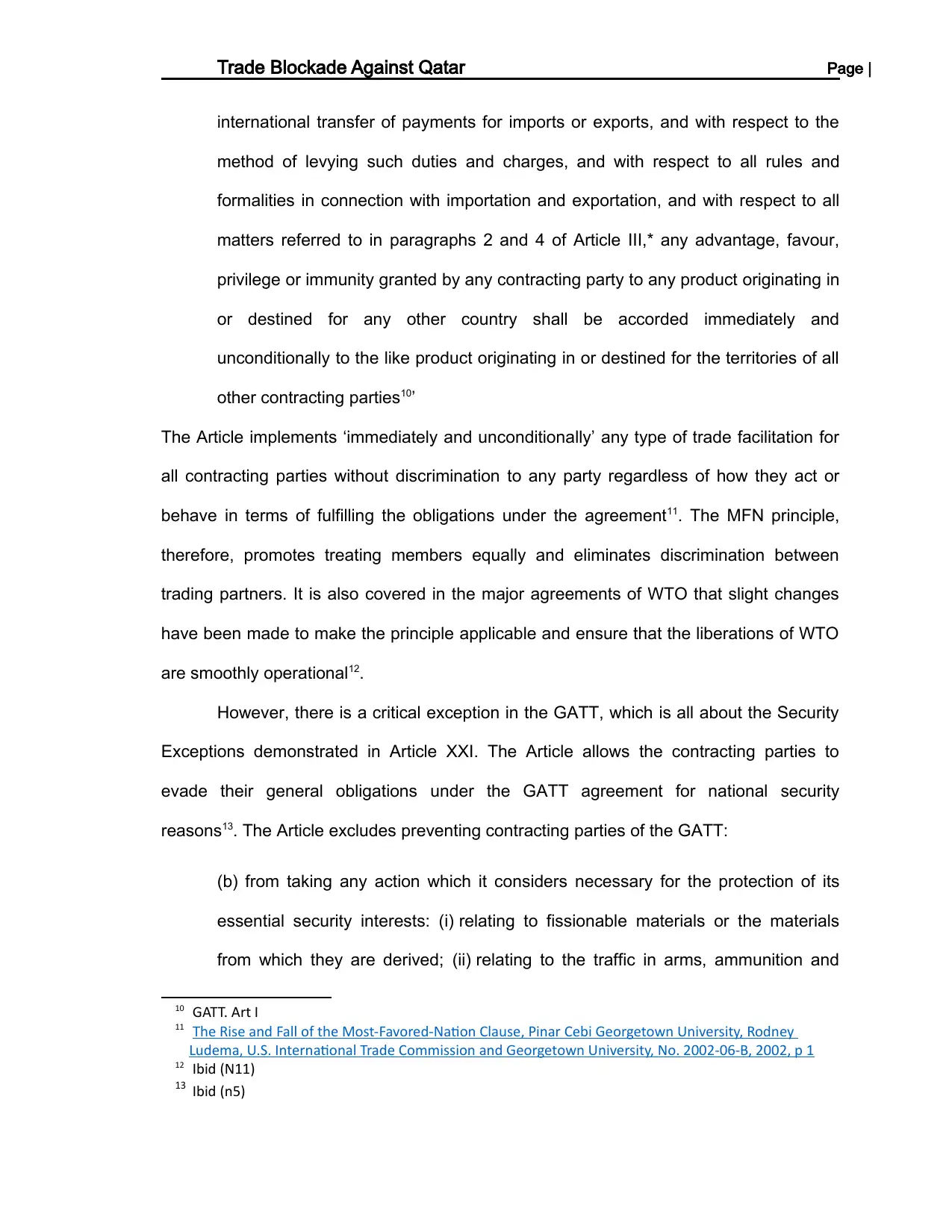
Trade Blockade Against Qatar Page |
international transfer of payments for imports or exports, and with respect to the
method of levying such duties and charges, and with respect to all rules and
formalities in connection with importation and exportation, and with respect to all
matters referred to in paragraphs 2 and 4 of Article III,* any advantage, favour,
privilege or immunity granted by any contracting party to any product originating in
or destined for any other country shall be accorded immediately and
unconditionally to the like product originating in or destined for the territories of all
other contracting parties10’
The Article implements ‘immediately and unconditionally’ any type of trade facilitation for
all contracting parties without discrimination to any party regardless of how they act or
behave in terms of fulfilling the obligations under the agreement11. The MFN principle,
therefore, promotes treating members equally and eliminates discrimination between
trading partners. It is also covered in the major agreements of WTO that slight changes
have been made to make the principle applicable and ensure that the liberations of WTO
are smoothly operational12.
However, there is a critical exception in the GATT, which is all about the Security
Exceptions demonstrated in Article XXI. The Article allows the contracting parties to
evade their general obligations under the GATT agreement for national security
reasons13. The Article excludes preventing contracting parties of the GATT:
(b) from taking any action which it considers necessary for the protection of its
essential security interests: (i) relating to fissionable materials or the materials
from which they are derived; (ii) relating to the traffic in arms, ammunition and
10 GATT. Art I
11 The Rise and Fall of the Most-Favored-Nation Clause, Pinar Cebi Georgetown University, Rodney
Ludema, U.S. International Trade Commission and Georgetown University, No. 2002-06-B, 2002, p 1
12 Ibid (N11)
13 Ibid (n5)
international transfer of payments for imports or exports, and with respect to the
method of levying such duties and charges, and with respect to all rules and
formalities in connection with importation and exportation, and with respect to all
matters referred to in paragraphs 2 and 4 of Article III,* any advantage, favour,
privilege or immunity granted by any contracting party to any product originating in
or destined for any other country shall be accorded immediately and
unconditionally to the like product originating in or destined for the territories of all
other contracting parties10’
The Article implements ‘immediately and unconditionally’ any type of trade facilitation for
all contracting parties without discrimination to any party regardless of how they act or
behave in terms of fulfilling the obligations under the agreement11. The MFN principle,
therefore, promotes treating members equally and eliminates discrimination between
trading partners. It is also covered in the major agreements of WTO that slight changes
have been made to make the principle applicable and ensure that the liberations of WTO
are smoothly operational12.
However, there is a critical exception in the GATT, which is all about the Security
Exceptions demonstrated in Article XXI. The Article allows the contracting parties to
evade their general obligations under the GATT agreement for national security
reasons13. The Article excludes preventing contracting parties of the GATT:
(b) from taking any action which it considers necessary for the protection of its
essential security interests: (i) relating to fissionable materials or the materials
from which they are derived; (ii) relating to the traffic in arms, ammunition and
10 GATT. Art I
11 The Rise and Fall of the Most-Favored-Nation Clause, Pinar Cebi Georgetown University, Rodney
Ludema, U.S. International Trade Commission and Georgetown University, No. 2002-06-B, 2002, p 1
12 Ibid (N11)
13 Ibid (n5)
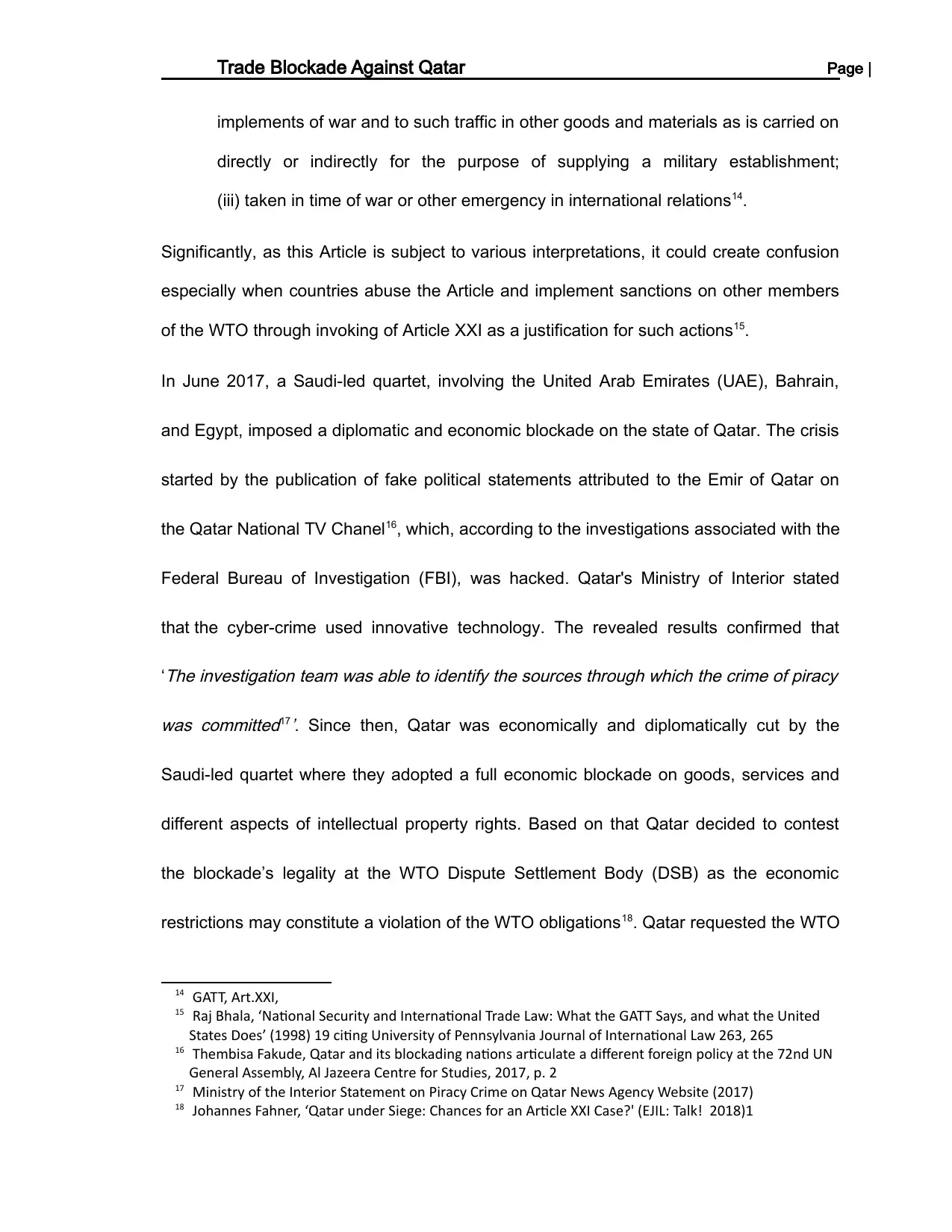
Trade Blockade Against Qatar Page |
implements of war and to such traffic in other goods and materials as is carried on
directly or indirectly for the purpose of supplying a military establishment;
(iii) taken in time of war or other emergency in international relations14.
Significantly, as this Article is subject to various interpretations, it could create confusion
especially when countries abuse the Article and implement sanctions on other members
of the WTO through invoking of Article XXI as a justification for such actions15.
In June 2017, a Saudi-led quartet, involving the United Arab Emirates (UAE), Bahrain,
and Egypt, imposed a diplomatic and economic blockade on the state of Qatar. The crisis
started by the publication of fake political statements attributed to the Emir of Qatar on
the Qatar National TV Chanel16, which, according to the investigations associated with the
Federal Bureau of Investigation (FBI), was hacked. Qatar's Ministry of Interior stated
that the cyber-crime used innovative technology. The revealed results confirmed that
‘
The investigation team was able to identify the sources through which the crime of piracy
was committed17
’. Since then, Qatar was economically and diplomatically cut by the
Saudi-led quartet where they adopted a full economic blockade on goods, services and
different aspects of intellectual property rights. Based on that Qatar decided to contest
the blockade’s legality at the WTO Dispute Settlement Body (DSB) as the economic
restrictions may constitute a violation of the WTO obligations18. Qatar requested the WTO
14 GATT, Art.XXI,
15 Raj Bhala, ‘National Security and International Trade Law: What the GATT Says, and what the United
States Does’ (1998) 19 citing University of Pennsylvania Journal of International Law 263, 265
16 Thembisa Fakude, Qatar and its blockading nations articulate a different foreign policy at the 72nd UN
General Assembly, Al Jazeera Centre for Studies, 2017, p. 2
17 Ministry of the Interior Statement on Piracy Crime on Qatar News Agency Website (2017)
18 Johannes Fahner, ‘Qatar under Siege: Chances for an Article XXI Case?' (EJIL: Talk! 2018)1
implements of war and to such traffic in other goods and materials as is carried on
directly or indirectly for the purpose of supplying a military establishment;
(iii) taken in time of war or other emergency in international relations14.
Significantly, as this Article is subject to various interpretations, it could create confusion
especially when countries abuse the Article and implement sanctions on other members
of the WTO through invoking of Article XXI as a justification for such actions15.
In June 2017, a Saudi-led quartet, involving the United Arab Emirates (UAE), Bahrain,
and Egypt, imposed a diplomatic and economic blockade on the state of Qatar. The crisis
started by the publication of fake political statements attributed to the Emir of Qatar on
the Qatar National TV Chanel16, which, according to the investigations associated with the
Federal Bureau of Investigation (FBI), was hacked. Qatar's Ministry of Interior stated
that the cyber-crime used innovative technology. The revealed results confirmed that
‘
The investigation team was able to identify the sources through which the crime of piracy
was committed17
’. Since then, Qatar was economically and diplomatically cut by the
Saudi-led quartet where they adopted a full economic blockade on goods, services and
different aspects of intellectual property rights. Based on that Qatar decided to contest
the blockade’s legality at the WTO Dispute Settlement Body (DSB) as the economic
restrictions may constitute a violation of the WTO obligations18. Qatar requested the WTO
14 GATT, Art.XXI,
15 Raj Bhala, ‘National Security and International Trade Law: What the GATT Says, and what the United
States Does’ (1998) 19 citing University of Pennsylvania Journal of International Law 263, 265
16 Thembisa Fakude, Qatar and its blockading nations articulate a different foreign policy at the 72nd UN
General Assembly, Al Jazeera Centre for Studies, 2017, p. 2
17 Ministry of the Interior Statement on Piracy Crime on Qatar News Agency Website (2017)
18 Johannes Fahner, ‘Qatar under Siege: Chances for an Article XXI Case?' (EJIL: Talk! 2018)1
⊘ This is a preview!⊘
Do you want full access?
Subscribe today to unlock all pages.

Trusted by 1+ million students worldwide
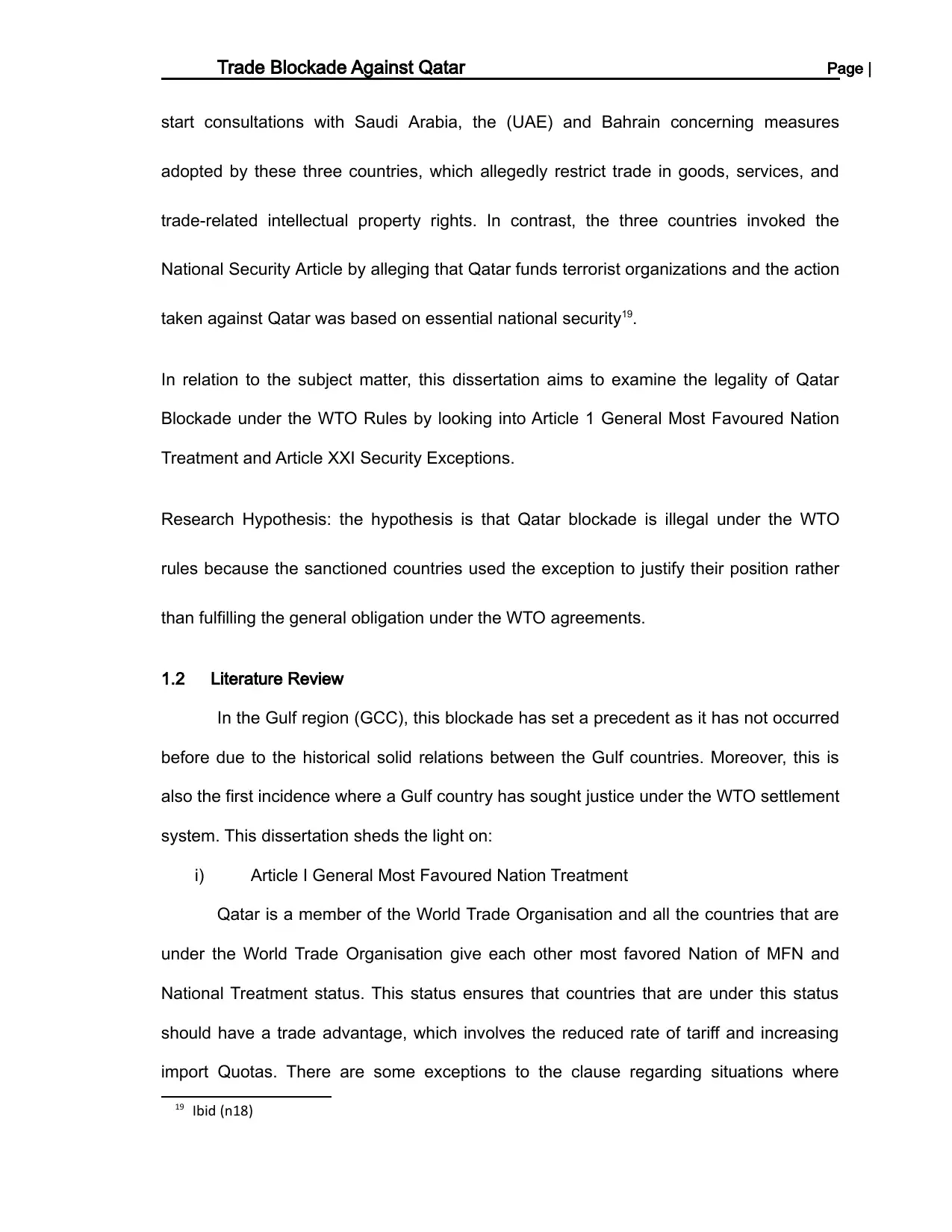
Trade Blockade Against Qatar Page |
start consultations with Saudi Arabia, the (UAE) and Bahrain concerning measures
adopted by these three countries, which allegedly restrict trade in goods, services, and
trade-related intellectual property rights. In contrast, the three countries invoked the
National Security Article by alleging that Qatar funds terrorist organizations and the action
taken against Qatar was based on essential national security19.
In relation to the subject matter, this dissertation aims to examine the legality of Qatar
Blockade under the WTO Rules by looking into Article 1 General Most Favoured Nation
Treatment and Article XXI Security Exceptions.
Research Hypothesis: the hypothesis is that Qatar blockade is illegal under the WTO
rules because the sanctioned countries used the exception to justify their position rather
than fulfilling the general obligation under the WTO agreements.
1.2 Literature Review
In the Gulf region (GCC), this blockade has set a precedent as it has not occurred
before due to the historical solid relations between the Gulf countries. Moreover, this is
also the first incidence where a Gulf country has sought justice under the WTO settlement
system. This dissertation sheds the light on:
i) Article I General Most Favoured Nation Treatment
Qatar is a member of the World Trade Organisation and all the countries that are
under the World Trade Organisation give each other most favored Nation of MFN and
National Treatment status. This status ensures that countries that are under this status
should have a trade advantage, which involves the reduced rate of tariff and increasing
import Quotas. There are some exceptions to the clause regarding situations where
19 Ibid (n18)
start consultations with Saudi Arabia, the (UAE) and Bahrain concerning measures
adopted by these three countries, which allegedly restrict trade in goods, services, and
trade-related intellectual property rights. In contrast, the three countries invoked the
National Security Article by alleging that Qatar funds terrorist organizations and the action
taken against Qatar was based on essential national security19.
In relation to the subject matter, this dissertation aims to examine the legality of Qatar
Blockade under the WTO Rules by looking into Article 1 General Most Favoured Nation
Treatment and Article XXI Security Exceptions.
Research Hypothesis: the hypothesis is that Qatar blockade is illegal under the WTO
rules because the sanctioned countries used the exception to justify their position rather
than fulfilling the general obligation under the WTO agreements.
1.2 Literature Review
In the Gulf region (GCC), this blockade has set a precedent as it has not occurred
before due to the historical solid relations between the Gulf countries. Moreover, this is
also the first incidence where a Gulf country has sought justice under the WTO settlement
system. This dissertation sheds the light on:
i) Article I General Most Favoured Nation Treatment
Qatar is a member of the World Trade Organisation and all the countries that are
under the World Trade Organisation give each other most favored Nation of MFN and
National Treatment status. This status ensures that countries that are under this status
should have a trade advantage, which involves the reduced rate of tariff and increasing
import Quotas. There are some exceptions to the clause regarding situations where
19 Ibid (n18)
Paraphrase This Document
Need a fresh take? Get an instant paraphrase of this document with our AI Paraphraser
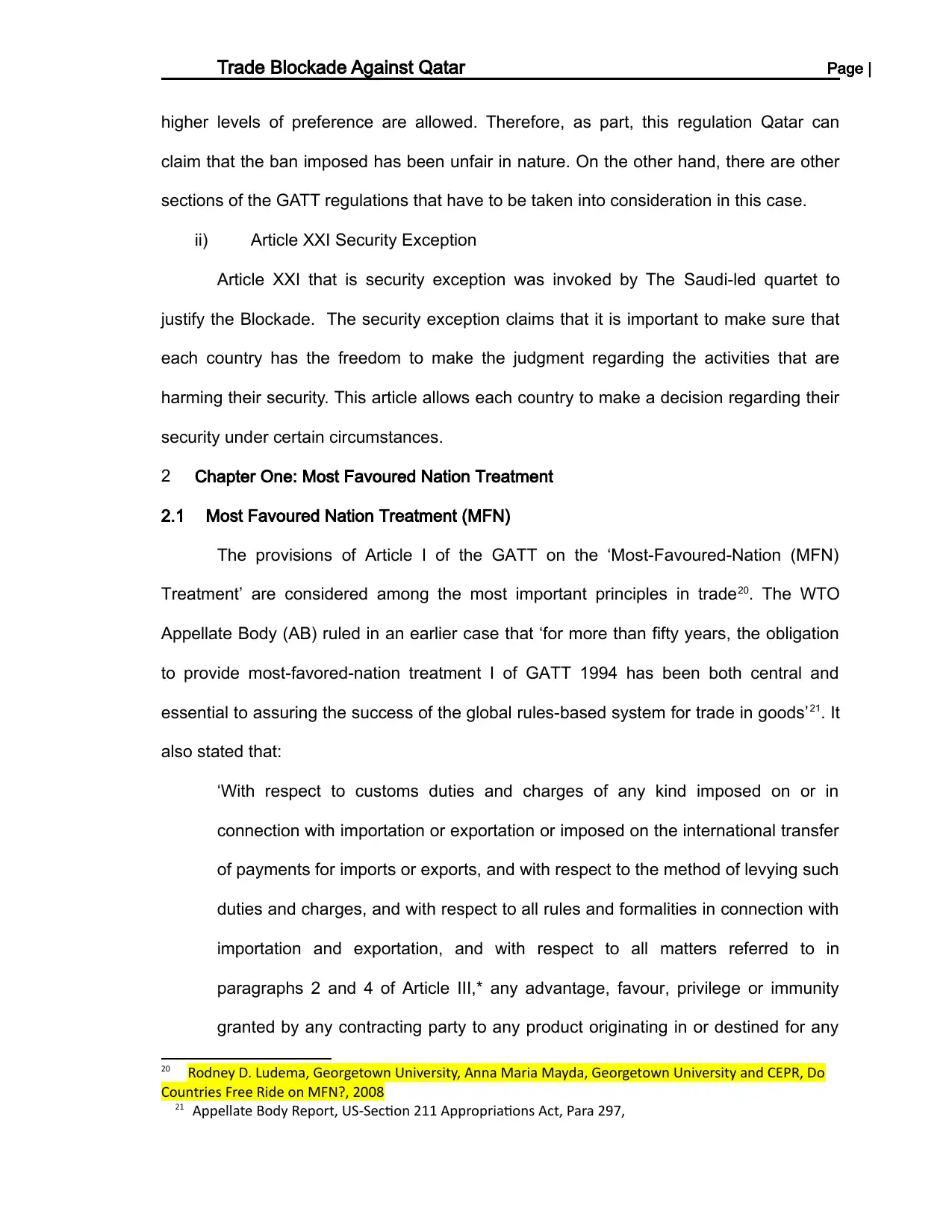
Trade Blockade Against Qatar Page |
higher levels of preference are allowed. Therefore, as part, this regulation Qatar can
claim that the ban imposed has been unfair in nature. On the other hand, there are other
sections of the GATT regulations that have to be taken into consideration in this case.
ii) Article XXI Security Exception
Article XXI that is security exception was invoked by The Saudi-led quartet to
justify the Blockade. The security exception claims that it is important to make sure that
each country has the freedom to make the judgment regarding the activities that are
harming their security. This article allows each country to make a decision regarding their
security under certain circumstances.
2 Chapter One: Most Favoured Nation Treatment
2.1 Most Favoured Nation Treatment (MFN)
The provisions of Article I of the GATT on the ‘Most-Favoured-Nation (MFN)
Treatment’ are considered among the most important principles in trade20. The WTO
Appellate Body (AB) ruled in an earlier case that ‘for more than fifty years, the obligation
to provide most-favored-nation treatment I of GATT 1994 has been both central and
essential to assuring the success of the global rules-based system for trade in goods’21. It
also stated that:
‘With respect to customs duties and charges of any kind imposed on or in
connection with importation or exportation or imposed on the international transfer
of payments for imports or exports, and with respect to the method of levying such
duties and charges, and with respect to all rules and formalities in connection with
importation and exportation, and with respect to all matters referred to in
paragraphs 2 and 4 of Article III,* any advantage, favour, privilege or immunity
granted by any contracting party to any product originating in or destined for any
20 Rodney D. Ludema, Georgetown University, Anna Maria Mayda, Georgetown University and CEPR, Do
Countries Free Ride on MFN?, 2008
21 Appellate Body Report, US-Section 211 Appropriations Act, Para 297,
higher levels of preference are allowed. Therefore, as part, this regulation Qatar can
claim that the ban imposed has been unfair in nature. On the other hand, there are other
sections of the GATT regulations that have to be taken into consideration in this case.
ii) Article XXI Security Exception
Article XXI that is security exception was invoked by The Saudi-led quartet to
justify the Blockade. The security exception claims that it is important to make sure that
each country has the freedom to make the judgment regarding the activities that are
harming their security. This article allows each country to make a decision regarding their
security under certain circumstances.
2 Chapter One: Most Favoured Nation Treatment
2.1 Most Favoured Nation Treatment (MFN)
The provisions of Article I of the GATT on the ‘Most-Favoured-Nation (MFN)
Treatment’ are considered among the most important principles in trade20. The WTO
Appellate Body (AB) ruled in an earlier case that ‘for more than fifty years, the obligation
to provide most-favored-nation treatment I of GATT 1994 has been both central and
essential to assuring the success of the global rules-based system for trade in goods’21. It
also stated that:
‘With respect to customs duties and charges of any kind imposed on or in
connection with importation or exportation or imposed on the international transfer
of payments for imports or exports, and with respect to the method of levying such
duties and charges, and with respect to all rules and formalities in connection with
importation and exportation, and with respect to all matters referred to in
paragraphs 2 and 4 of Article III,* any advantage, favour, privilege or immunity
granted by any contracting party to any product originating in or destined for any
20 Rodney D. Ludema, Georgetown University, Anna Maria Mayda, Georgetown University and CEPR, Do
Countries Free Ride on MFN?, 2008
21 Appellate Body Report, US-Section 211 Appropriations Act, Para 297,
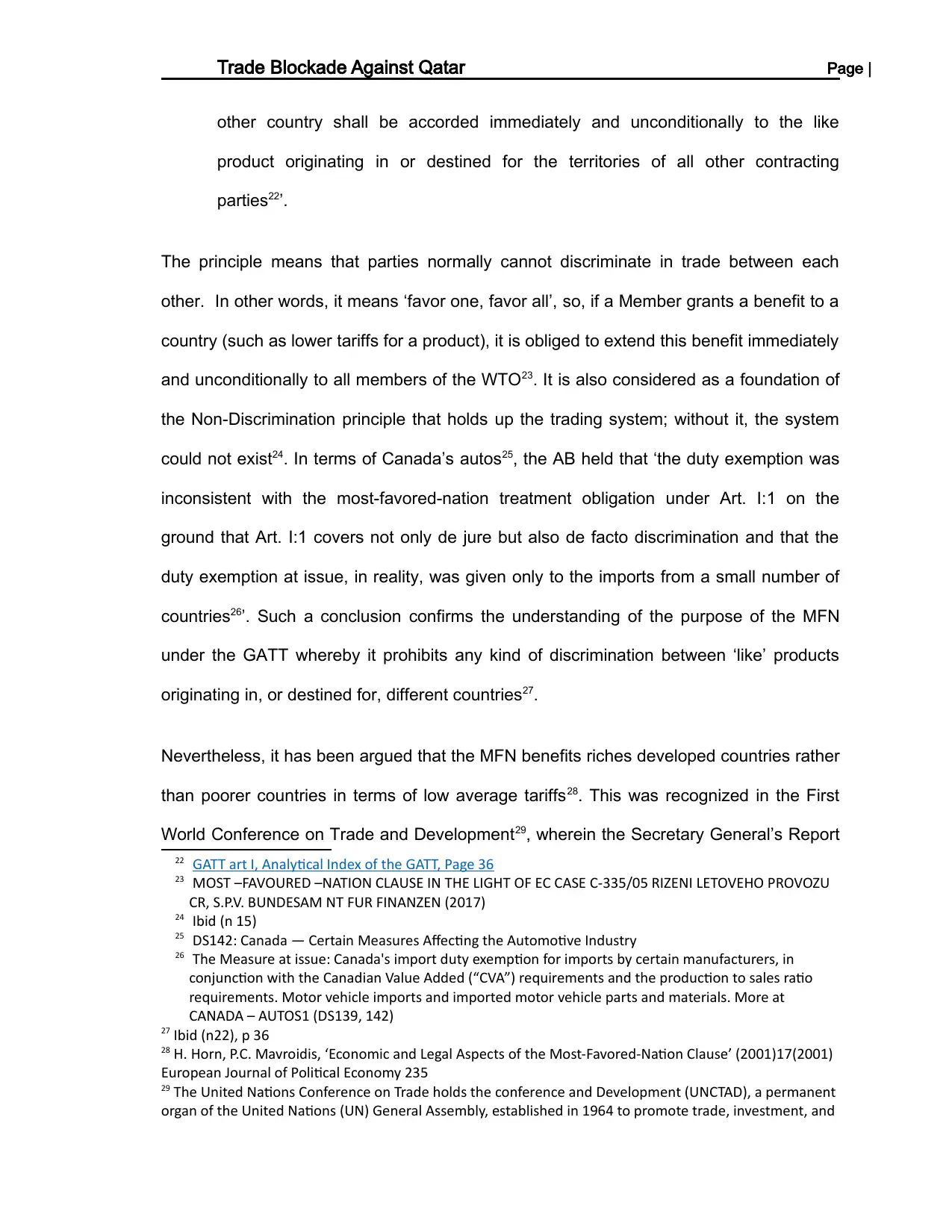
Trade Blockade Against Qatar Page |
other country shall be accorded immediately and unconditionally to the like
product originating in or destined for the territories of all other contracting
parties22’.
The principle means that parties normally cannot discriminate in trade between each
other. In other words, it means ‘favor one, favor all’, so, if a Member grants a benefit to a
country (such as lower tariffs for a product), it is obliged to extend this benefit immediately
and unconditionally to all members of the WTO23. It is also considered as a foundation of
the Non-Discrimination principle that holds up the trading system; without it, the system
could not exist24. In terms of Canada’s autos25, the AB held that ‘the duty exemption was
inconsistent with the most-favored-nation treatment obligation under Art. I:1 on the
ground that Art. I:1 covers not only de jure but also de facto discrimination and that the
duty exemption at issue, in reality, was given only to the imports from a small number of
countries26’. Such a conclusion confirms the understanding of the purpose of the MFN
under the GATT whereby it prohibits any kind of discrimination between ‘like’ products
originating in, or destined for, different countries27.
Nevertheless, it has been argued that the MFN benefits riches developed countries rather
than poorer countries in terms of low average tariffs28. This was recognized in the First
World Conference on Trade and Development29, wherein the Secretary General’s Report
22 GATT art I, Analytical Index of the GATT, Page 36
23 MOST –FAVOURED –NATION CLAUSE IN THE LIGHT OF EC CASE C-335/05 RIZENI LETOVEHO PROVOZU
CR, S.P.V. BUNDESAM NT FUR FINANZEN (2017)
24 Ibid (n 15)
25 DS142: Canada — Certain Measures Affecting the Automotive Industry
26 The Measure at issue: Canada's import duty exemption for imports by certain manufacturers, in
conjunction with the Canadian Value Added (“CVA”) requirements and the production to sales ratio
requirements. Motor vehicle imports and imported motor vehicle parts and materials. More at
CANADA – AUTOS1 (DS139, 142)
27 Ibid (n22), p 36
28 H. Horn, P.C. Mavroidis, ‘Economic and Legal Aspects of the Most-Favored-Nation Clause’ (2001)17(2001)
European Journal of Political Economy 235
29 The United Nations Conference on Trade holds the conference and Development (UNCTAD), a permanent
organ of the United Nations (UN) General Assembly, established in 1964 to promote trade, investment, and
other country shall be accorded immediately and unconditionally to the like
product originating in or destined for the territories of all other contracting
parties22’.
The principle means that parties normally cannot discriminate in trade between each
other. In other words, it means ‘favor one, favor all’, so, if a Member grants a benefit to a
country (such as lower tariffs for a product), it is obliged to extend this benefit immediately
and unconditionally to all members of the WTO23. It is also considered as a foundation of
the Non-Discrimination principle that holds up the trading system; without it, the system
could not exist24. In terms of Canada’s autos25, the AB held that ‘the duty exemption was
inconsistent with the most-favored-nation treatment obligation under Art. I:1 on the
ground that Art. I:1 covers not only de jure but also de facto discrimination and that the
duty exemption at issue, in reality, was given only to the imports from a small number of
countries26’. Such a conclusion confirms the understanding of the purpose of the MFN
under the GATT whereby it prohibits any kind of discrimination between ‘like’ products
originating in, or destined for, different countries27.
Nevertheless, it has been argued that the MFN benefits riches developed countries rather
than poorer countries in terms of low average tariffs28. This was recognized in the First
World Conference on Trade and Development29, wherein the Secretary General’s Report
22 GATT art I, Analytical Index of the GATT, Page 36
23 MOST –FAVOURED –NATION CLAUSE IN THE LIGHT OF EC CASE C-335/05 RIZENI LETOVEHO PROVOZU
CR, S.P.V. BUNDESAM NT FUR FINANZEN (2017)
24 Ibid (n 15)
25 DS142: Canada — Certain Measures Affecting the Automotive Industry
26 The Measure at issue: Canada's import duty exemption for imports by certain manufacturers, in
conjunction with the Canadian Value Added (“CVA”) requirements and the production to sales ratio
requirements. Motor vehicle imports and imported motor vehicle parts and materials. More at
CANADA – AUTOS1 (DS139, 142)
27 Ibid (n22), p 36
28 H. Horn, P.C. Mavroidis, ‘Economic and Legal Aspects of the Most-Favored-Nation Clause’ (2001)17(2001)
European Journal of Political Economy 235
29 The United Nations Conference on Trade holds the conference and Development (UNCTAD), a permanent
organ of the United Nations (UN) General Assembly, established in 1964 to promote trade, investment, and
⊘ This is a preview!⊘
Do you want full access?
Subscribe today to unlock all pages.

Trusted by 1+ million students worldwide
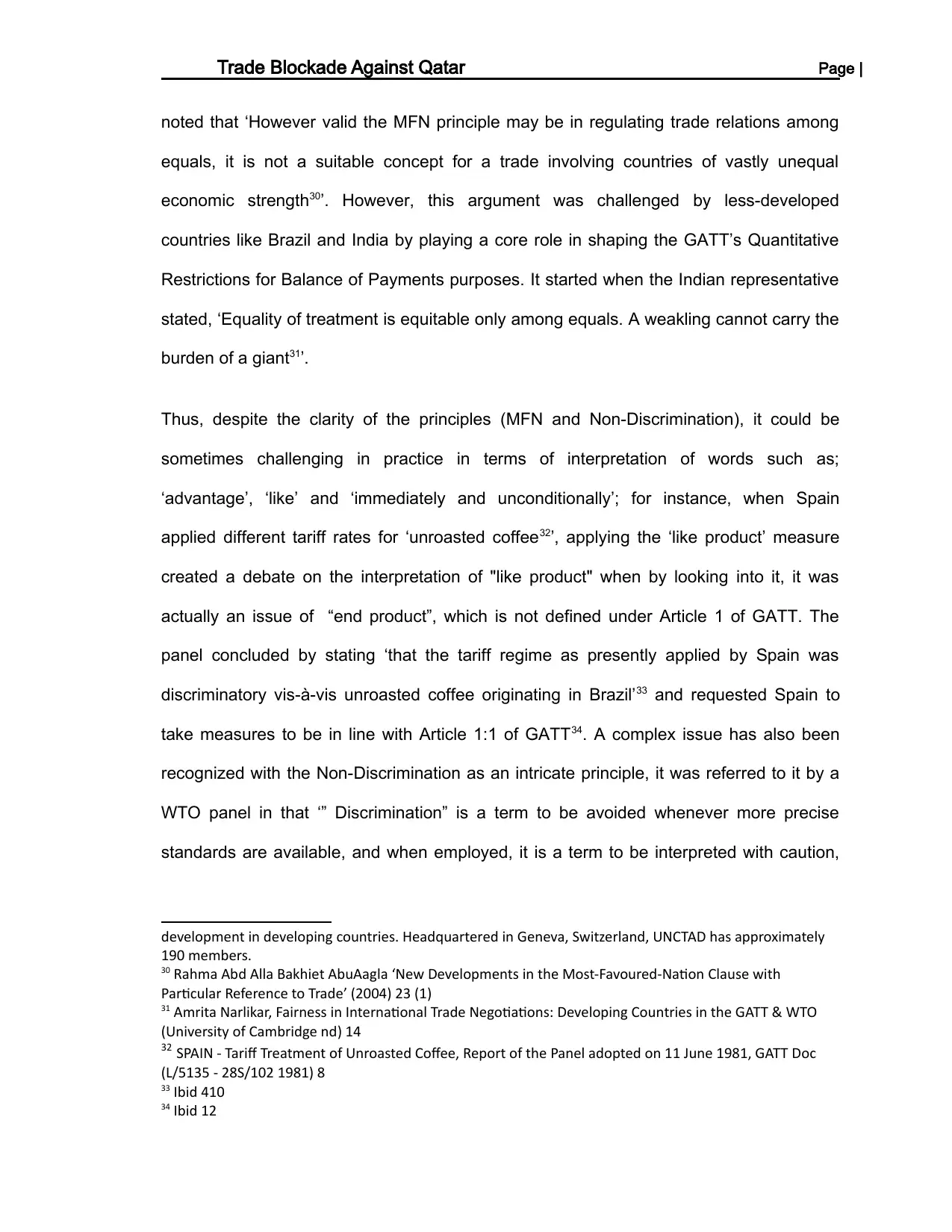
Trade Blockade Against Qatar Page |
noted that ‘However valid the MFN principle may be in regulating trade relations among
equals, it is not a suitable concept for a trade involving countries of vastly unequal
economic strength30’. However, this argument was challenged by less-developed
countries like Brazil and India by playing a core role in shaping the GATT’s Quantitative
Restrictions for Balance of Payments purposes. It started when the Indian representative
stated, ‘Equality of treatment is equitable only among equals. A weakling cannot carry the
burden of a giant31’.
Thus, despite the clarity of the principles (MFN and Non-Discrimination), it could be
sometimes challenging in practice in terms of interpretation of words such as;
‘advantage’, ‘like’ and ‘immediately and unconditionally’; for instance, when Spain
applied different tariff rates for ‘unroasted coffee32’, applying the ‘like product’ measure
created a debate on the interpretation of "like product" when by looking into it, it was
actually an issue of “end product”, which is not defined under Article 1 of GATT. The
panel concluded by stating ‘that the tariff regime as presently applied by Spain was
discriminatory vis-à-vis unroasted coffee originating in Brazil’33 and requested Spain to
take measures to be in line with Article 1:1 of GATT34. A complex issue has also been
recognized with the Non-Discrimination as an intricate principle, it was referred to it by a
WTO panel in that ‘” Discrimination” is a term to be avoided whenever more precise
standards are available, and when employed, it is a term to be interpreted with caution,
development in developing countries. Headquartered in Geneva, Switzerland, UNCTAD has approximately
190 members.
30 Rahma Abd Alla Bakhiet AbuAagla ‘New Developments in the Most-Favoured-Nation Clause with
Particular Reference to Trade’ (2004) 23 (1)
31 Amrita Narlikar, Fairness in International Trade Negotiations: Developing Countries in the GATT & WTO
(University of Cambridge nd) 14
32 SPAIN - Tariff Treatment of Unroasted Coffee, Report of the Panel adopted on 11 June 1981, GATT Doc
(L/5135 - 28S/102 1981) 8
33 Ibid 410
34 Ibid 12
noted that ‘However valid the MFN principle may be in regulating trade relations among
equals, it is not a suitable concept for a trade involving countries of vastly unequal
economic strength30’. However, this argument was challenged by less-developed
countries like Brazil and India by playing a core role in shaping the GATT’s Quantitative
Restrictions for Balance of Payments purposes. It started when the Indian representative
stated, ‘Equality of treatment is equitable only among equals. A weakling cannot carry the
burden of a giant31’.
Thus, despite the clarity of the principles (MFN and Non-Discrimination), it could be
sometimes challenging in practice in terms of interpretation of words such as;
‘advantage’, ‘like’ and ‘immediately and unconditionally’; for instance, when Spain
applied different tariff rates for ‘unroasted coffee32’, applying the ‘like product’ measure
created a debate on the interpretation of "like product" when by looking into it, it was
actually an issue of “end product”, which is not defined under Article 1 of GATT. The
panel concluded by stating ‘that the tariff regime as presently applied by Spain was
discriminatory vis-à-vis unroasted coffee originating in Brazil’33 and requested Spain to
take measures to be in line with Article 1:1 of GATT34. A complex issue has also been
recognized with the Non-Discrimination as an intricate principle, it was referred to it by a
WTO panel in that ‘” Discrimination” is a term to be avoided whenever more precise
standards are available, and when employed, it is a term to be interpreted with caution,
development in developing countries. Headquartered in Geneva, Switzerland, UNCTAD has approximately
190 members.
30 Rahma Abd Alla Bakhiet AbuAagla ‘New Developments in the Most-Favoured-Nation Clause with
Particular Reference to Trade’ (2004) 23 (1)
31 Amrita Narlikar, Fairness in International Trade Negotiations: Developing Countries in the GATT & WTO
(University of Cambridge nd) 14
32 SPAIN - Tariff Treatment of Unroasted Coffee, Report of the Panel adopted on 11 June 1981, GATT Doc
(L/5135 - 28S/102 1981) 8
33 Ibid 410
34 Ibid 12
Paraphrase This Document
Need a fresh take? Get an instant paraphrase of this document with our AI Paraphraser
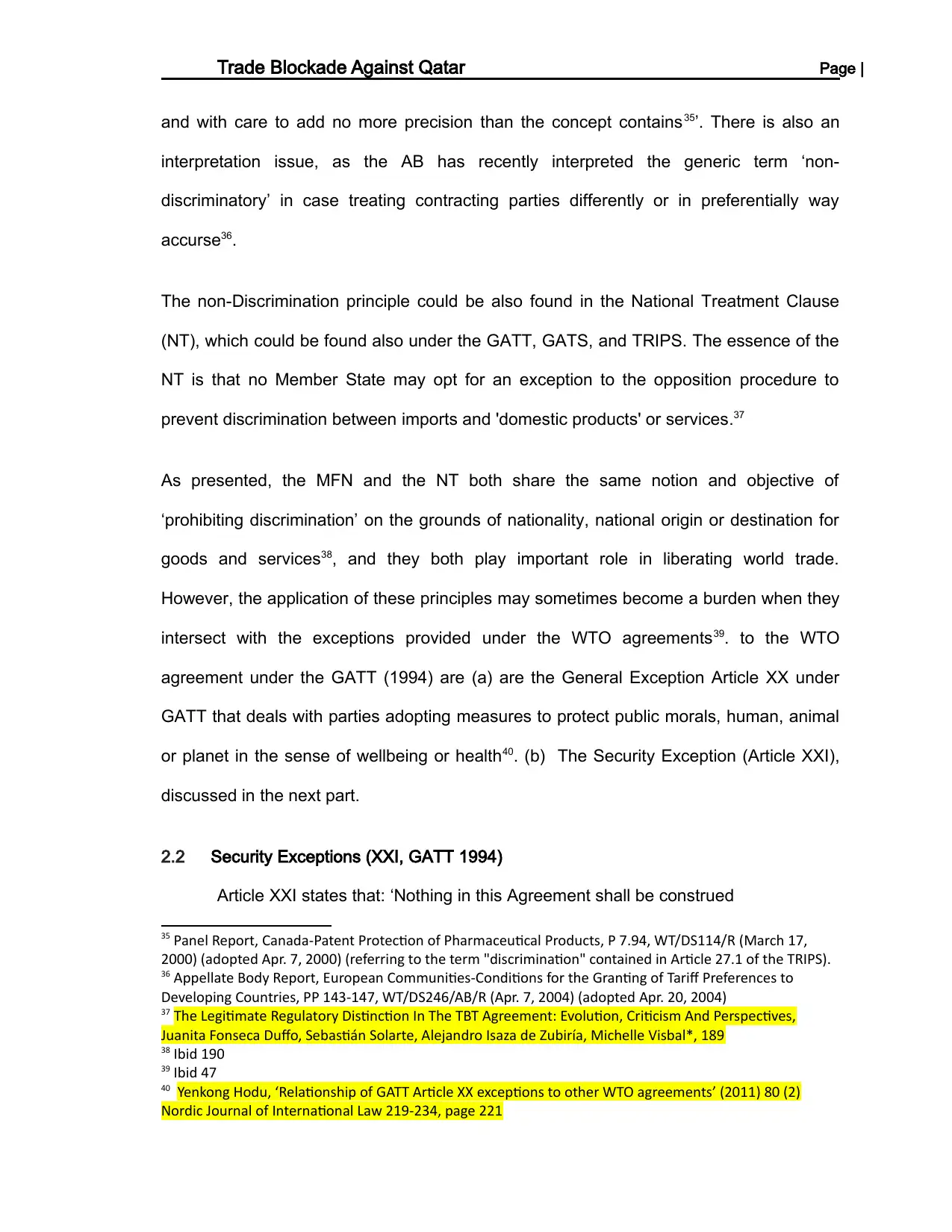
Trade Blockade Against Qatar Page |
and with care to add no more precision than the concept contains35’. There is also an
interpretation issue, as the AB has recently interpreted the generic term ‘non-
discriminatory’ in case treating contracting parties differently or in preferentially way
accurse36.
The non-Discrimination principle could be also found in the National Treatment Clause
(NT), which could be found also under the GATT, GATS, and TRIPS. The essence of the
NT is that no Member State may opt for an exception to the opposition procedure to
prevent discrimination between imports and 'domestic products' or services.37
As presented, the MFN and the NT both share the same notion and objective of
‘prohibiting discrimination’ on the grounds of nationality, national origin or destination for
goods and services38, and they both play important role in liberating world trade.
However, the application of these principles may sometimes become a burden when they
intersect with the exceptions provided under the WTO agreements39. to the WTO
agreement under the GATT (1994) are (a) are the General Exception Article XX under
GATT that deals with parties adopting measures to protect public morals, human, animal
or planet in the sense of wellbeing or health40. (b) The Security Exception (Article XXI),
discussed in the next part.
2.2 Security Exceptions (XXI, GATT 1994)
Article XXI states that: ‘Nothing in this Agreement shall be construed
35 Panel Report, Canada-Patent Protection of Pharmaceutical Products, P 7.94, WT/DS114/R (March 17,
2000) (adopted Apr. 7, 2000) (referring to the term "discrimination" contained in Article 27.1 of the TRIPS).
36 Appellate Body Report, European Communities-Conditions for the Granting of Tariff Preferences to
Developing Countries, PP 143-147, WT/DS246/AB/R (Apr. 7, 2004) (adopted Apr. 20, 2004)
37 The Legitimate Regulatory Distinction In The TBT Agreement: Evolution, Criticism And Perspectives,
Juanita Fonseca Duffo, Sebastián Solarte, Alejandro Isaza de Zubiría, Michelle Visbal*, 189
38 Ibid 190
39 Ibid 47
40 Yenkong Hodu, ‘Relationship of GATT Article XX exceptions to other WTO agreements’ (2011) 80 (2)
Nordic Journal of International Law 219-234, page 221
and with care to add no more precision than the concept contains35’. There is also an
interpretation issue, as the AB has recently interpreted the generic term ‘non-
discriminatory’ in case treating contracting parties differently or in preferentially way
accurse36.
The non-Discrimination principle could be also found in the National Treatment Clause
(NT), which could be found also under the GATT, GATS, and TRIPS. The essence of the
NT is that no Member State may opt for an exception to the opposition procedure to
prevent discrimination between imports and 'domestic products' or services.37
As presented, the MFN and the NT both share the same notion and objective of
‘prohibiting discrimination’ on the grounds of nationality, national origin or destination for
goods and services38, and they both play important role in liberating world trade.
However, the application of these principles may sometimes become a burden when they
intersect with the exceptions provided under the WTO agreements39. to the WTO
agreement under the GATT (1994) are (a) are the General Exception Article XX under
GATT that deals with parties adopting measures to protect public morals, human, animal
or planet in the sense of wellbeing or health40. (b) The Security Exception (Article XXI),
discussed in the next part.
2.2 Security Exceptions (XXI, GATT 1994)
Article XXI states that: ‘Nothing in this Agreement shall be construed
35 Panel Report, Canada-Patent Protection of Pharmaceutical Products, P 7.94, WT/DS114/R (March 17,
2000) (adopted Apr. 7, 2000) (referring to the term "discrimination" contained in Article 27.1 of the TRIPS).
36 Appellate Body Report, European Communities-Conditions for the Granting of Tariff Preferences to
Developing Countries, PP 143-147, WT/DS246/AB/R (Apr. 7, 2004) (adopted Apr. 20, 2004)
37 The Legitimate Regulatory Distinction In The TBT Agreement: Evolution, Criticism And Perspectives,
Juanita Fonseca Duffo, Sebastián Solarte, Alejandro Isaza de Zubiría, Michelle Visbal*, 189
38 Ibid 190
39 Ibid 47
40 Yenkong Hodu, ‘Relationship of GATT Article XX exceptions to other WTO agreements’ (2011) 80 (2)
Nordic Journal of International Law 219-234, page 221
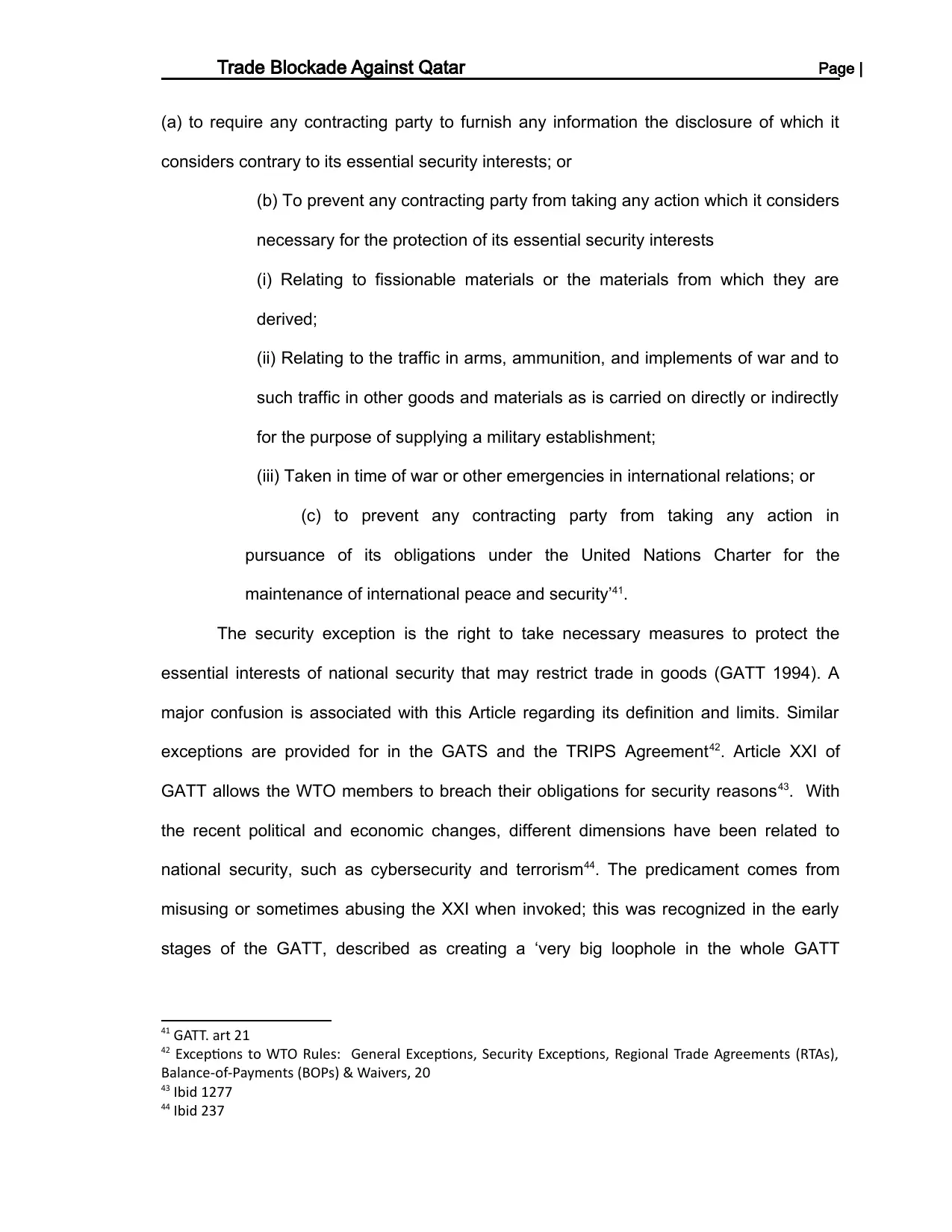
Trade Blockade Against Qatar Page |
(a) to require any contracting party to furnish any information the disclosure of which it
considers contrary to its essential security interests; or
(b) To prevent any contracting party from taking any action which it considers
necessary for the protection of its essential security interests
(i) Relating to fissionable materials or the materials from which they are
derived;
(ii) Relating to the traffic in arms, ammunition, and implements of war and to
such traffic in other goods and materials as is carried on directly or indirectly
for the purpose of supplying a military establishment;
(iii) Taken in time of war or other emergencies in international relations; or
(c) to prevent any contracting party from taking any action in
pursuance of its obligations under the United Nations Charter for the
maintenance of international peace and security’41.
The security exception is the right to take necessary measures to protect the
essential interests of national security that may restrict trade in goods (GATT 1994). A
major confusion is associated with this Article regarding its definition and limits. Similar
exceptions are provided for in the GATS and the TRIPS Agreement42. Article XXI of
GATT allows the WTO members to breach their obligations for security reasons43. With
the recent political and economic changes, different dimensions have been related to
national security, such as cybersecurity and terrorism44. The predicament comes from
misusing or sometimes abusing the XXI when invoked; this was recognized in the early
stages of the GATT, described as creating a ‘very big loophole in the whole GATT
41 GATT. art 21
42 Exceptions to WTO Rules: General Exceptions, Security Exceptions, Regional Trade Agreements (RTAs),
Balance-of-Payments (BOPs) & Waivers, 20
43 Ibid 1277
44 Ibid 237
(a) to require any contracting party to furnish any information the disclosure of which it
considers contrary to its essential security interests; or
(b) To prevent any contracting party from taking any action which it considers
necessary for the protection of its essential security interests
(i) Relating to fissionable materials or the materials from which they are
derived;
(ii) Relating to the traffic in arms, ammunition, and implements of war and to
such traffic in other goods and materials as is carried on directly or indirectly
for the purpose of supplying a military establishment;
(iii) Taken in time of war or other emergencies in international relations; or
(c) to prevent any contracting party from taking any action in
pursuance of its obligations under the United Nations Charter for the
maintenance of international peace and security’41.
The security exception is the right to take necessary measures to protect the
essential interests of national security that may restrict trade in goods (GATT 1994). A
major confusion is associated with this Article regarding its definition and limits. Similar
exceptions are provided for in the GATS and the TRIPS Agreement42. Article XXI of
GATT allows the WTO members to breach their obligations for security reasons43. With
the recent political and economic changes, different dimensions have been related to
national security, such as cybersecurity and terrorism44. The predicament comes from
misusing or sometimes abusing the XXI when invoked; this was recognized in the early
stages of the GATT, described as creating a ‘very big loophole in the whole GATT
41 GATT. art 21
42 Exceptions to WTO Rules: General Exceptions, Security Exceptions, Regional Trade Agreements (RTAs),
Balance-of-Payments (BOPs) & Waivers, 20
43 Ibid 1277
44 Ibid 237
⊘ This is a preview!⊘
Do you want full access?
Subscribe today to unlock all pages.

Trusted by 1+ million students worldwide
1 out of 44
Your All-in-One AI-Powered Toolkit for Academic Success.
+13062052269
info@desklib.com
Available 24*7 on WhatsApp / Email
![[object Object]](/_next/static/media/star-bottom.7253800d.svg)
Unlock your academic potential
Copyright © 2020–2026 A2Z Services. All Rights Reserved. Developed and managed by ZUCOL.
